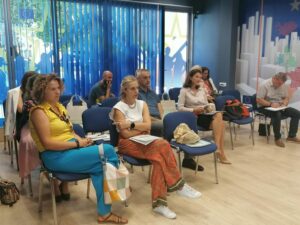The association of parents of children and youth with developmental disabilities “Path” from Podgorica, in partnership with the non-governmental organisations “Children of Montenegro” from Tuzi and “Impuls” from Niksic, within the project “Professional and timely provision of services after COVID” – which was financially supported by the European Union, conducted research on the impact of the COVID-19 pandemic on students and their parents, with a focus on children and youth with special educational needs and children and parents from other vulnerable groups. The results were presented at the Europe House.
After the data was collected, the analysis conducted, and the findings obtained, conclusions were drawn regarding the overall and specific educational consequences of COVID-19 on vulnerable groups. The pandemic had a negative impact on the quality of knowledge, work habits, school experience, and teachers’ attitudes. There was developmental and academic stagnation, regression, insecurity appeared, a drop in initiative, motivation, attention, and attitude towards obligations.
When it comes to the examination of the public opinion, the data on the sample of 1,055 respondents shows that there was an impact on the spheres of life in terms of social relations, contact and socialisation, and mental health. The impact on education is reflected mostly in terms of socialisation, work habits, quality of knowledge, and socio-emotional status. From a regional point of view, in the closing phase, children from the central region were deprived the most, but support was most lacking for those from the north, while on the coast, the least constructive and targeted work, individualisation and adaptation was done. COVID-19 adversely affected all children, but mostly those with developmental disabilities than from families with unstable and unfavourable socio-economic conditions. This is especially true for children from the northern region of Montenegro.

When it comes to teachers, the biggest challenge was in relation to adaptation, the organisation of life and work, and IT knowledge and competencies (especially when it comes to teachers from the north of the country). For parents, it was most demanding to combine family and business obligations, complicating and multiplying roles (parent-teacher-educator-animator). Those who work with children are particularly and statistically significantly aware of this. All developmental-academic aspects experienced regressions, but attention, motivation, and emotional status stand out the most.
During the experience with COVID-19, parents, teachers, and assistants mostly worked with children, and the assessment of the insufficient participation of professional associates (individual work in accordance with the principles of professions) – especially pedagogues – appears worrying. This points to the need to better apply initial and basic professional legalities, as well as to provide them with knowledge about the needs of appropriate intervention in a crisis. In terms of improving the system and inclusion in general, it is necessary to improve professional support, assistance, emphasise individualisation, extracurricular activities, increase the number of support services for parents, and, as a priority, further strengthen attitudes of acceptance and understanding of these children’s needs.
